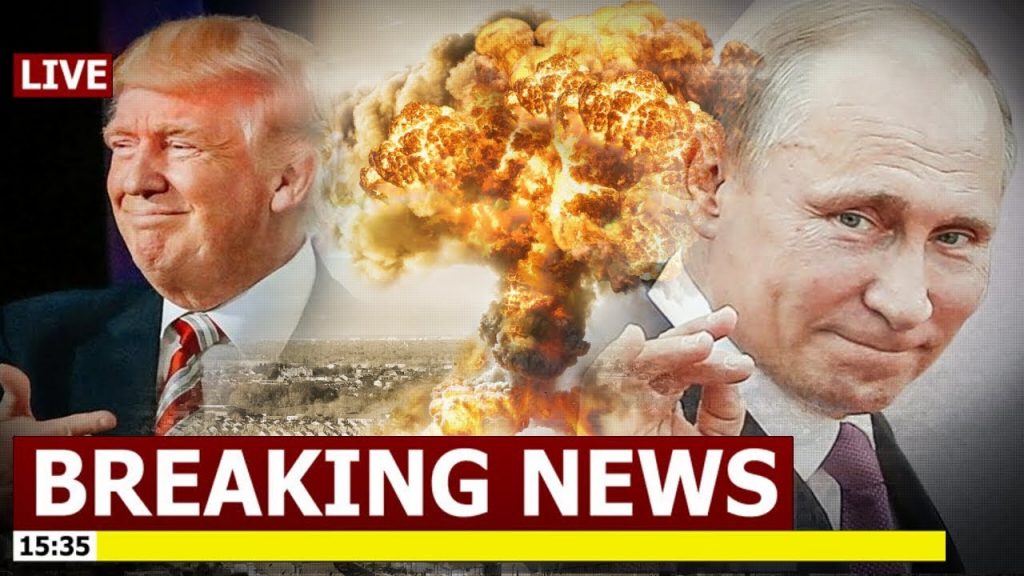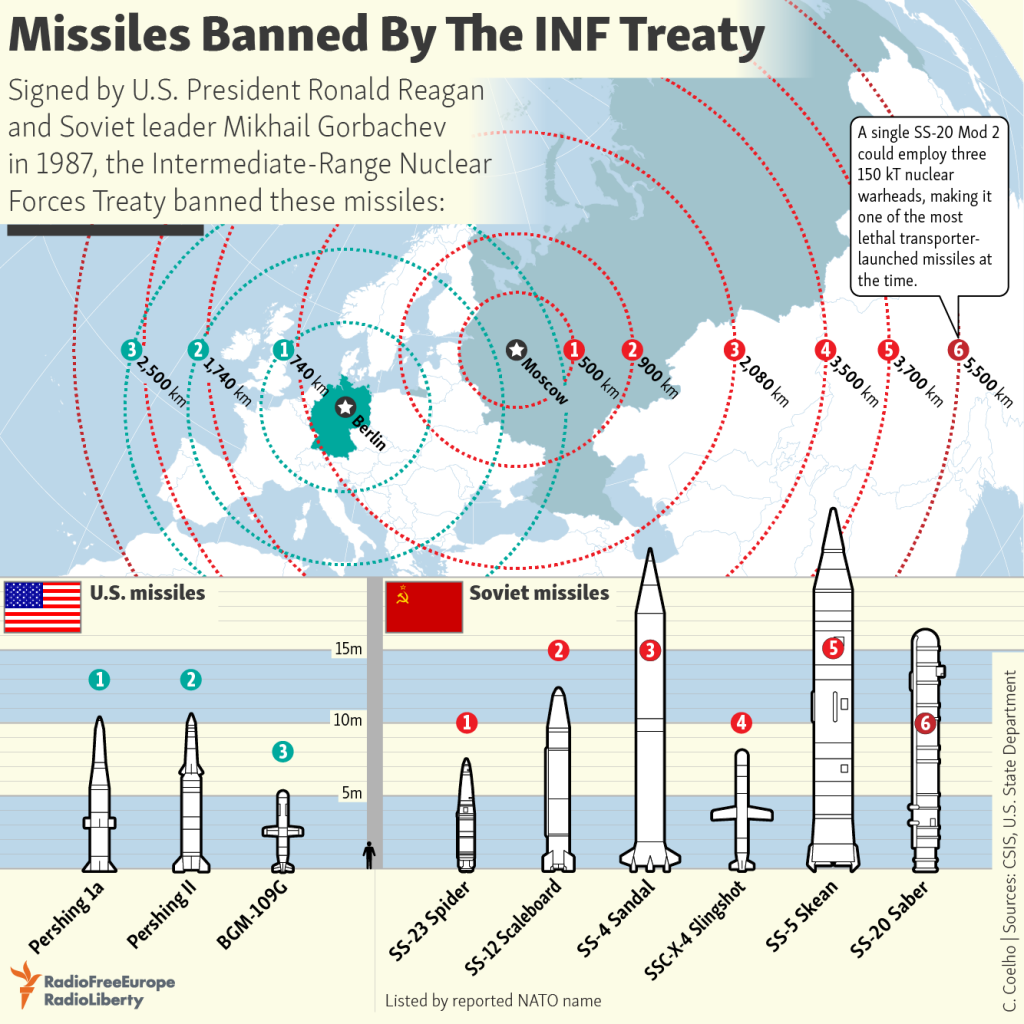- GOLD IRA
- Download Our 2024 Precious Metals IRA Investor’s Guide.
Click Here  Gold IRA
Gold IRA
 Investing
Investing
-
- CRYPTO IRA
- PRICES & STATS
- RETIREMENT PLANS
- BLOG
 Questions? Call (888) 820 1042
Questions? Call (888) 820 1042
U.S. – Russian Relations Suffer Another Setback as Nuclear treaty Hangs in the Balance
Disclosure: Our content does not constitute financial advice. Speak to your financial advisor. We may earn money from companies reviewed. Learn more

This past week saw a new international geopolitical crisis break out involving Vladimir Putin's Russia. The Russians seized three Ukrainian naval vessels and took them to Kerch. Kiev has responded by declaring martial law and warning of an imminent invasion by their Russian neighbors. The unfolding crisis caused such an international stir that U.S. President Donald Trump cancelled a planned multiple hour meeting with Putin that was scheduled for the G-20 summit sidelines in Buenos Aires.
As serious as this latest crisis is on several levels, it is overshadowing another one that involves the Russo-American nuclear arms treaty. This 30 year old landmark deal is now in serious danger of being canceled, marking yet another low point in U.S.-Russian relations. Now is the time to take action to protect your investment and retirement portfolios with IRA-approved gold. The latest geopolitical turbulence with Russia that threatens world stability is a great reminder of why gold makes sense in an IRA. You need to look into the Top five gold coins for investors now before safe haven precious metals' prices spike higher.
Ukraine Prepares to Defend What Remains of its Country From Russian Aggression
Unsurprisingly, the Ukrainians are fearful and defensive over what they call intelligence that the Russians are going to invade and finish the job of taking over the beleaguered nation. President Petro Poroshenko issued a stern warning that Russia will suffer severe consequences if it attacks Ukraine. The Russians claim that it was the Ukrainians who illegally trespassed in Russian waters, but the international community does not accept the Russian argument. President Poroshenko pledged on NBC news that:
“We will fight for our freedom, we will fight for our democracy, we will fight for our soil. The Russians will pay a huge price if they attack us.”
The already rocky relations between Ukraine and Russia have just reached all-time lows. Moscow is holding 23 naval Ukrainian navel crew members hostage who they captured along with the ships in the Kerch Strait that lies south of both Ukraine and Russia. The 2003 treaty that guaranteed free naval access to the Sea of Azov and the Kerch Strait has now been violated.
These troubles date back to 2014 when the Russians first seized Crimea from Ukraine and then covertly sponsored a Russian-aided uprising in the east of Ukraine. Moscow tried to deny it had anything to do with the eastern Ukrainian invasion, yet the Europeans, Americans, and other Western nations applied a variety of sanctions in an effort to motivate the Russians into ceasing aggression and returning stolen territories.
Finally the Ukrainian president felt he had no choice but to respond with a declaration of martial law in parts of the nation that shared a border with Russia. He has warned that the Russians are threatening them with a full-scale land invasion.
Trump Cancels Russia Meetings at the G20 Over the Affair
U.S. President Trump was incensed by the latest Russian aggression in Eastern Europe. A mere days before a much-touted meeting with Russia's Putin to deal with a host of important global issues and disputes between the two powers, President Trump canceled this meeting in protest when Russia did not heed his ultimatum to return the Ukrainian naval ships and sailors before the G-20 summit in Buenos Aires.
Latest Ukrainian-Russian Crisis Overshadowing Peril of U.S.-Russian Nuclear Treaty End
Yet this is not the potentially greatest crisis brewing between Washington and Moscow. Last month, President Trump announced that he will pull out of the INF Intermediate Range Nuclear Forces Treaty. This treaty that President Reagan signed with Soviet Union President Gorbachev back in 1987 outlawed building or testing ground-based cruise missiles that possess a from 300 to 3,400 mile range.
It has ensured that no nuclear missiles sat on European soil for thirty years. This graphic shows the many missiles it effectively eliminated across Europe:

The problem is that Russia has been violating the terms of this arms agreement for years now. American National Security Adviser John Bolton traveled to Russia to share the landmark withdrawal decision with Moscow in person. Bolton emerged from his closed door meeting with Vladimir Putin and shared with reporters that:
“It is the American position that Russia is in violation. It is Russia's position that they are not in violation. So one has to ask, ‘How do you convince the Russians to come back into compliance with obligations they don't think they're violating'?”
This INF treaty agreement back in the day eliminated over 2,500 missiles that had mid-ranges up to 3,400 miles. But with Russia quietly cheating and caught in the act, Director Thomas Karako from the Missle Defense Project at the Center for Strategic and International Studies defended the U.S. administration's position:
“Given Russian violations, there's no question the U.S. is justified in withdrawing. But we don't want withdrawal to merely let Russia off the hook without other robust actions to support U.S. deterrence and defense goals.”
The Pentagon also supported the decision to withdraw from the INF Treaty with Russia. Spokesman U.S. Army Colonel Rob Manning of the Pentagon repeated:
“The secretary of Defense has consistently said that Russia has not been in compliance with the treaty. The secretary is completely aligned with the President, and he is in close contact with the President on this.”
The problem is a little-remembered exchange that took place in Brussels, Belgium back in October. It was then that Secretary of Defense Jim Mattis informed reporters that if the U.S. decided to pull out of the INF treaty, it would do this after consulting with its close NATO allies. This is because the Russian nuclear missiles threaten the European allies most seriously. Mattis had stated then:
“This will be a decision obviously made in concert with our allies by the President. We are trying to bring them [Russia] still back into compliance. And now is the time. It's gone on long enough.”
The Pentagon would not answer the question when reporters asked the spokesman if Secretary Mattis had in fact coordinated with the other NATO members before the President announced the withdrawal. Instead they referred the question to the White House.
Latest Russian Moves Drives A Further Wedge Between the U.S. and European Allies
Not everyone in Europe agrees with more punishment for Russia's latest aggression,. Germany is opposed to more sanctions over the Kerch affair. Italy's populist government has gone further and announced that it is completely against all sanctions on Russia.
In October, Italy's Deputy Premier Matteo Salvini (one of the two leaders of the Italian populist government) informed Moscow's Russian industrialists that:
“I come here free of charge because I think the sanctions are economic, social, and cultural madness.” Continued sanctions are “an absurdity.”
Reporters at the meeting wanted to know if Italy would now potentially veto sanctions renewals in the European Union. Salvini was a little more elusive on this score, claiming that:
“We can only use once the trump card of the veto in Europe. There's the question of the EU budget, the question of migration, and the budget, which I don't know what to play if they reject it, but we'll carry on all the same. We are counting on the fact that they are intelligent enough in Brussels to understand that they have gone over the top and that you have to return to good relations between the EU, Italy, and Russia.”
The Russians already have succeeded in driving a wedge between key EU members such as Italy and Brussels as well as the U.S. and NATO.
Geopolitics in the World Today Argue More Strongly For Gold Than In Decades
The world seems to become more geopolitically imperiled every month. Russia is only the latest example of trouble brewing around the globe. It all threatens global stability and domestic and international equities markets.
This is why you can not put all of your eggs in a basket that can become a hostage to geopolitical problems. Gold is the answer to the threats against your portfolio. Now you can buy gold in monthly installments. The IRS will also allow you to store your safe haven portfolio investment overseas in top offshore storage locations for your IRA gold.



 Silver
Silver Gold
Gold Platinum
Platinum Palladium
Palladium Bitcoin
Bitcoin Ethereum
Ethereum

 Gold: $2,387.15
Gold: $2,387.15
 Silver: $27.92
Silver: $27.92
 Platinum: $931.67
Platinum: $931.67
 Palladium: $903.43
Palladium: $903.43
 Bitcoin: $67,909.13
Bitcoin: $67,909.13
 Ethereum: $3,254.68
Ethereum: $3,254.68